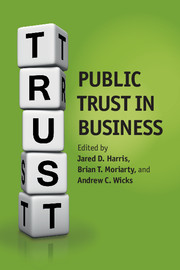Book contents
- Frontmatter
- Contents
- List of figures
- List of tables
- Notes on contributors
- Preface: discovering new territory in public trust in business
- Acknowledgments
- 1 Public trust in business: what’s the problem and why does it matter?
- Part I Trusting the institution of business
- Part II Public trust and business organizations
- Index
Preface: discovering new territory in public trust in business
Published online by Cambridge University Press: 05 July 2014
- Frontmatter
- Contents
- List of figures
- List of tables
- Notes on contributors
- Preface: discovering new territory in public trust in business
- Acknowledgments
- 1 Public trust in business: what’s the problem and why does it matter?
- Part I Trusting the institution of business
- Part II Public trust and business organizations
- Index
Summary
Despite the importance of public trust in business, very little scholarly work has been written on this topic. While the literature on organizational trust – both interpersonal and interorganizational – is vast and growing rapidly – particularly in the field of management – much less academic research has been conducted on public trust in business as an institution. Based on top executives identifying trust in business as their biggest concern, we held several seminars with executives, journalists, and governance experts during 2007, in both Washington, DC and New York, to seek their input and increase our understanding of their practical perspective on the crisis of trust in business. Based on what we learned, and with the further erosion of public trust in business with the onset of the global financial crisis, we issued both a preliminary report on the topic, and convened the 2009 Ruffin Summit on Public Trust at the University of Virginia’s Darden School of Business, which involved twenty-five top thought leaders on trust across a variety of disciplines. This volume includes papers presented at the summit, and other invited papers, to gather what we believe to be the best current thinking on the problem. The scholarship in this volume speaks in detail to this critically important topic, and raises a variety of questions that beg for further attention.
Part I of this volume focuses on public trust in business as an institution. In Chapter 2, Eric M. Uslaner analyzes data from multiple surveys of the US population to determine the extent to which the global economic crisis caused a reduction of trust in government and in generalized trust. Using these same data sets, he explores whether the economic crisis played a key role in support of the Tea Party movements, and whether these movements in turn lowered levels of trust.
- Type
- Chapter
- Information
- Public Trust in Business , pp. xv - xviiiPublisher: Cambridge University PressPrint publication year: 2014



